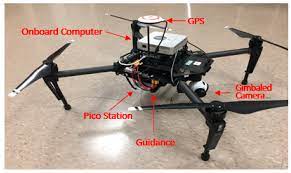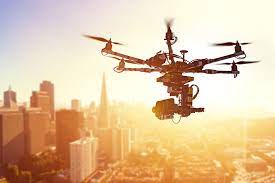Autonomous drones, also known as unmanned aerial vehicles (UAVs), are rapidly transforming many industries and applications. From aerial surveillance to package delivery, autonomous drones are providing new opportunities and efficiencies for businesses and organizations worldwide. In this article, we will explore the applications of autonomous drones, and their potential impact on society and the global economy.
Aerial Surveillance and Security
One of the most common applications of autonomous drones is aerial surveillance and security. Autonomous drones can be equipped with cameras and sensors that can capture high-quality images and video from above, providing valuable information for law enforcement, security, and emergency response services. Autonomous drones can also be used to monitor and protect critical infrastructure, such as power plants, pipelines, and transportation systems.
Agriculture and Crop Monitoring
Autonomous drones are also being used in agriculture and crop monitoring to improve yields and reduce costs. Drones can be equipped with cameras and sensors that can capture images and data about crop health, soil moisture, and other factors that can affect crop growth and yields. This information can be used to optimize crop management, including irrigation, fertilization, and pest control, leading to increased yields and reduced costs for farmers.
Environmental Monitoring and Conservation
Autonomous drones are also being used in environmental monitoring and conservation to track and study wildlife, monitor ecosystems, and detect and respond to natural disasters. Drones can be equipped with cameras and sensors that can capture images and data about environmental conditions, including air quality, water quality, and climate patterns. This information can be used to inform conservation and disaster management efforts, and to identify areas of concern for further study and action.

Infrastructure Inspection and Maintenance
Autonomous drones are also being used in infrastructure inspection and maintenance to improve safety and efficiency. Drones can be equipped with cameras and sensors that can capture images and data about infrastructure conditions, including bridges, roads, and buildings. This information can be used to identify areas of concern, such as cracks or corrosion, and to schedule maintenance and repairs before they become more serious and costly.
Package Delivery
Autonomous drones are also being used in package delivery to provide faster and more efficient delivery services. Drones can be equipped with small packages and can fly directly to their destination, avoiding traffic and other obstacles. This can help to reduce delivery times and costs, and can provide new opportunities for businesses and consumers alike.
The applications of autonomous drones are diverse and multifaceted, and are transforming many industries and applications. From aerial surveillance and security to package delivery, autonomous drones are providing new opportunities and efficiencies for businesses and organizations worldwide. To ensure that autonomous drones are used in a responsible and ethical manner, it is important to consider their impact on society and the environment, and to establish ethical guidelines and standards for their development and use. With diligence and preparation, individuals and organizations can build a better future for themselves and for society as a whole.
Additional Tips for the Responsible Use of Autonomous Drones
Establish Ethical Guidelines and Standards
To promote the responsible use of autonomous drones, it is important to establish ethical guidelines and standards for their development and use. This can help to ensure that autonomous drones are developed and used in a responsible and ethical manner, and can help to mitigate the risks and challenges associated with their use.

Promote Transparency and Accountability
Transparency and accountability are essential for promoting the responsible use of autonomous drones. This includes ensuring that drones are developed and used in a transparent and accountable manner, and that their impact on society and the environment is carefully monitored and evaluated. This can help to ensure that autonomous drones are developed and used in a responsible and ethical manner, and can help to mitigate the risks and challenges associated with their use.
Involve Governments and Regulatory Bodies
Governments and regulatory bodies have an important role to play in promoting the responsible use of autonomous drones. This includes establishing ethical guidelines and standards for the development and use of these technologies, as well as ensuring that these guidelines and standards are enforced. Governments and regulatory bodies can also invest in research and development of autonomous drones, and can promote the development of new technologies that are safe, reliable, and sustainable.
Engage the Public and Stakeholders
Public engagement and education are also important for promoting the responsible use of autonomous drones. This includes engaging with the public and stakeholders to ensure that their concerns and perspectives are taken into account in the development and use of these technologies. It also includes educating the public about the risks and benefits of autonomous drones, and promoting public dialogue and debate about their impact on society and the global economy.
Develop Ethical Autonomous Drones
Developing autonomous drones that are ethical and responsible is essential for promoting their ethical and responsible use. This includes developing drones that are safe, reliable, and sustainable, and that are designed to benefit society and the global economy. It also includes developing drones that are transparent and accountable, and that are programmed using unbiased data and algorithms.
Foster Collaboration and Innovation
Collaboration and innovation are also important for promoting the responsible use of autonomous drones. This includes fostering collaboration between researchers, developers, and stakeholders, and promoting innovation in the development and use of these technologies. By working together to develop and use autonomous drones in a responsible and ethical manner, we can ensure that these technologies are used to benefit society and the global economy, and that their impact is carefully monitored and evaluated.
Address Privacy and Security Concerns
Autonomous drones can collect and process large amounts of data, raising concerns about privacy and security. To promote the responsible use of autonomous drones, it is important to address these concerns by implementing appropriate privacy and security measures. This includes ensuring that data collected by drones is protected and used in a responsible and ethical manner, and that drones are equipped with appropriate security features to prevent unauthorized access.
Promote Sustainability and Environmental Responsibility
Autonomous drones can also have an impact on the environment, particularly in terms of their energy consumption and carbon emissions. To promote the responsible use of autonomous drones, it is important to promote sustainability and environmental responsibility in their development and use. This includes designing drones that are energy efficient and environmentally friendly, and using them in a way that minimizes their impact on the environment.
Conclusion
The applications of autonomous drones are diverse and multifaceted, and will continue to transform many industries and applications in the years to come. To ensure that autonomous drones are used in a responsible and ethical manner, it is important to establish ethical guidelines and standards for their development and use, promote transparency and accountability, involve governments and regulatory bodies, engage the public and stakeholders, develop ethical autonomous drones, foster collaboration and innovation, address privacy and security concerns, and promote sustainability and environmental responsibility.
By working together to address the risks and challenges associated with the use of autonomous drones, we can ensure that these technologies are used to benefit society and the global economy, and that their impact is carefully monitored and evaluated.















